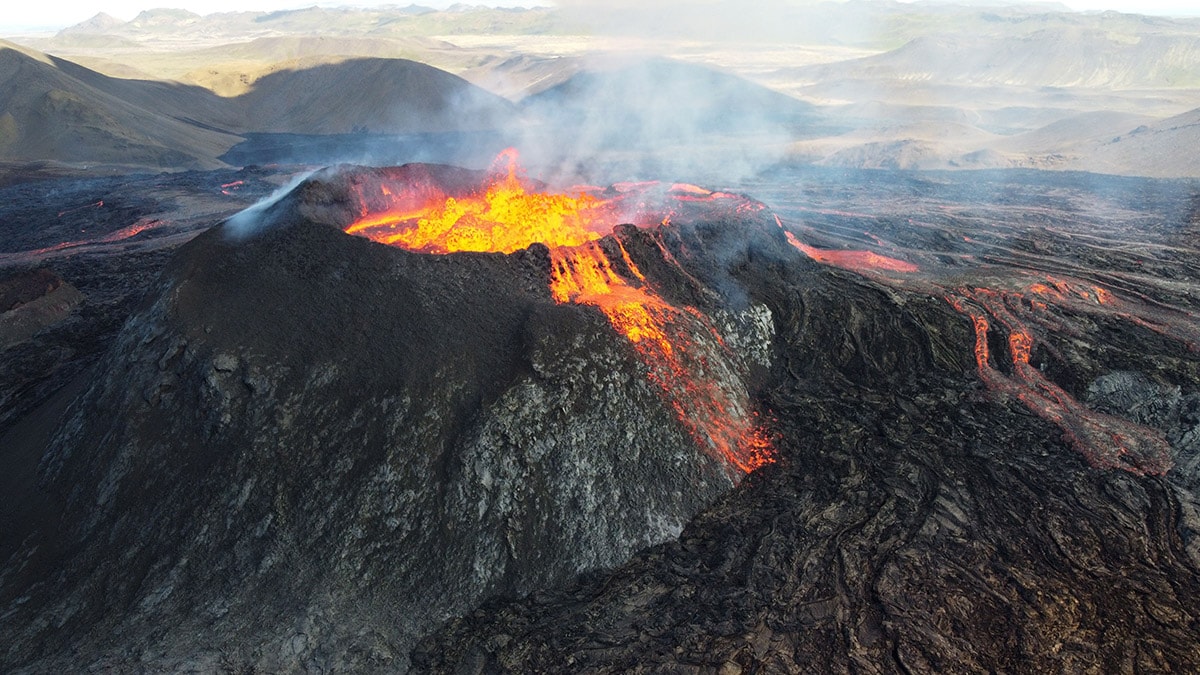At a glance
- Inhaling volcanic gases and ash can be harmful to your health.
- When a volcanic eruption occurs, follow local guidance on how to respond.
- Take additional steps to protect your health from air pollution during a volcanic eruption.
Volcanic eruptions can affect your health

Volcanoes are geographical formations where lava, small rocks, and steam are released onto the surface of the earth. There are hundreds of active volcanoes around the world and over 160 active volcanoes in the United States. Twelve U.S. states—Alaska, Arizona, California, Colorado, Hawaii, Idaho, Nevada, New Mexico, Oregon, Utah, Washington, and Wyoming—have active volcanoes. Volcanic eruptions can result in serious health hazards.
Volcanoes and air pollution
When a volcano erupts it can release harmful particles, including volcanic gases and ash, into the air.
Important volcanic gases that may impact your health include the following:
- Carbon dioxide (CO2)
- Sulfur dioxide (SO2)
- Hydrogen chloride (HCl)
- Hydrogen sulfide (H2S)
- Radon (Rn)
- Hydrogen fluoride (HF)
- Sulfuric acid (H2SO4)
Many volcanic gases are odorless or invisible, so there is often little or no warning to help people avoid dangerous exposure.
Volcanoes and your health
Inhaling volcanic gases and ash can be harmful to your health. Breathing in volcanic gases at high concentrations can cause mild symptoms, such as irritation of the eyes, and more severe symptoms, such as difficulty breathing or even death.
Short-term effects
Most of the effects from volcanic particles and gases are short term. Short-term effects of gas inhalation include the following:
- Irritation of eyes or airways
- Vomiting
- Dizziness
- Headaches
- Rapid or difficult breathing
- Visual disturbances
- Tremors
Long-term effects
Longer exposure to volcanic gases and ash has been linked to the development of other conditions, such as:
- Bronchitis and infection of the lung
- Respiratory disorders, such as lung disease and lung cancer
Acute exposures to certain volcanic gases can also lead to unconsciousness within minutes and eventually death.
People at increased risk
Who is most at risk for health problems associated with exposure to volcanic gases?
People most likely to experience negative health effects from volcanic gases and ash include the following:
- People with asthma
- Children and babies
- People with chronic respiratory or cardiac conditions
If you have asthma, exposure to volcanic gases and ash can make your symptoms worse. Carefully follow your asthma action plan on days when pollution levels are high. Avoid exposure as much as possible and carry your medication with you.
How to protect yourself
Follow local guidance.
When a volcanic eruption occurs, follow local guidance on how to respond.
- If you start to have symptoms, move away from the area immediately. Your symptoms should improve or stop when you are away from the gases.
- If your symptoms continue, contact your healthcare provider.
Go inside and keep your indoor clean.
To limit exposure to gases and ash, go indoors and keep your indoor air clear by following these steps:
- Close and lock all outside doors and windows.
- Turn off all heating and air conditioning units and fans.
- Close any fireplace or woodstove dampers.
- Replace or clean furnace filters.
Note that during heavy ashfall you may not be able to stay indoors for more than a couple hours as the weight of ash on the roof of your building may cause the roof to collapse or air intake to be blocked.
Take precautions if you need to be outside.
If you must be outside, take these steps:
- Avoid ashfall as much as you can.
- Reduce your chances of inhaling ash by wearing a NIOSH Approved N95 respirator while outdoors or when cleaning up. Check that it is sealed tightly to your face.
- Carry your medication with you if you have a respiratory condition.
- Avoid low-lying areas.
- Wear long sleeves and long pants to avoid skin irritation.
- Use goggles to protect your eyes.
Learn more about steps you can take to protect yourself before, during, and after a volcanic eruption.
Resources
- Natural Disasters and Severe Weather
- American Red Cross: Volcano
- Federal Emergency Management Agency: Volcanoes: Are You Ready?
- Hawaii Emergency Management Agency: Hawaii Emergency Management Agency Information on 2018 Kilauea Eruptionexternal icon
- Mt. St. Helens
- U.S. Geological Survey
- Washington State Department of Health: Volcanoes (also available in Spanish)
